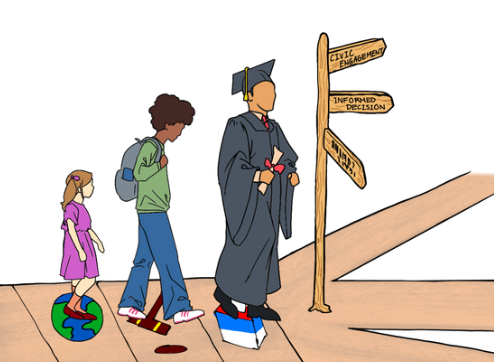Written By Shagun Khare
Published in the April 17, 2015 Issue
From the moment we enter high school, we are told that the following four years are ours to grasp—to grow as individuals, to learn and, most importantly, to prepare ourselves for college. However, being a subject of such high regard in the Palo Alto community, “college”—a word that has arisen in countless family dinners and school lunch conversations—has subsequently evolved into a subject of anxiety for many students. The idea of going to an elite college is etched into our minds as the sole path to success, and thus, we waste all of our energy in high school trying to live up to this fallacious standard. However, the community should bring to light that college admissions do not determine a student’s success. To stimulate this paradigm shift, students, parents and staff need to collaborate to enforce both cultural and physical transitions at Gunn.
Rather than trying to make themselves “look good for college,” students should utilize their time in high school to explore areas of interest. Students often enroll in higher lanes of a subject in order to have more Honors or Advanced Placement (AP) class on their transcript, rather than from a desire to learn. However, it is important to realize that one or two extra advanced classes will not guarantee college admis- sions. Rather than struggling in the high lane of a subject that you could care less about, it is better to push yourself in subjects that you might want to pursue after your high school career. This way, you can have more time for extracurriculars, like school clubs or sports, without additional stress from hard classes.
Additionally, students often participate in activities or classes that they don’t enjoy in order to get into a college they hope, or their parents hope, is prestigious.
This perception is skewed. Students go to college to learn more about subjects they enjoy, not to have a name on their re?sume?. So, while they should explore as many subjects as possible, they should not necessarily feel inclined to pursue them all. To make sure that students do not feel pressured, more constructive conversations with parents and counselors will be beneficial. Instead of simply sitting down for a quick conversation about scheduling, counselors and parents should make more of an effort to understand students’ interests and advise them accordingly.
Finally, both students and parents should remember that the college one goes to does not define who they are or the life they will lead. Many believe that going to a prestigious college will provide an easier transition to a highly respectable job. However, nine out of the 10 chief executives of the top corporations in the Fortune 500 did not go to a top college—that means that 90 percent of the top executives in the world did not have to go to an Ivy League school to make some of the biggest impacts on our lives. Innovators like Steve Jobs, Larry Ellison and J.K. Rowling are prime examples of this. At Gunn, there seems to be a constant pressure to go to a school like Stanford, when, in reality, anyone can be successful if they put in the effort, regardless of the school they go to. Therefore, parents should stop compar- ing their children to others that have gone to more well-known universities, for these comparisons only provoke feelings of degradation and worthlessness within oneself, rather than motivation. Going to a less well-known university is not a sign of adversity, and parents should take pride in the fact that their child is beginning a new chapter in their life.
There is a right place for everyone, and with thousands of applicants and an average acceptance rate of just 8.8 percent, it’s clear that an Ivy League school is not where many of us are meant to be—and that is perfectly okay. Because ultimately, it is the way in which one chooses to experience college that impacts his future, not the name of it. As a community, it is imperative to realize that we will be remembered in this world not for the college we went to, but for the legacy we leave behind.









